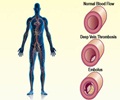Compression ultrasonography, a single ultrasound scan, may rule out a diagnosis of deep vein thrombosis (DVT) in women during pregnancy or in the initial weeks after birthing i.e. post-partum period.

During pregnancy the risk of DVT increases, but accurately diagnosing it is a challenge for doctors. Tests that are safe and reliable in non-pregnant patients are not always appropriate to use during pregnancy.
So a team of researchers, led by Professor Grégoire Le Gal from the University of Brest in France, set out to assess the safety of a single complete compression ultrasonography in pregnant and post-partum women with suspected DVT.
The study included 210 pregnant and post-partum women referred for suspected DVT from medical practices in France and Switzerland.
A single compression ultrasound scan was performed on each patient and anti-clotting treatment was given to those with a positive result. All women were followed up for three months.
Deep vein thrombosis was diagnosed in 22 (10.5%) of the 210 women. Of the 177 patients without deep vein thrombosis and who did not receive anti-clotting treatment, two patients (1.1%) experienced a confirmed DVT during follow-up.
Advertisement
Source-Eurekalert














